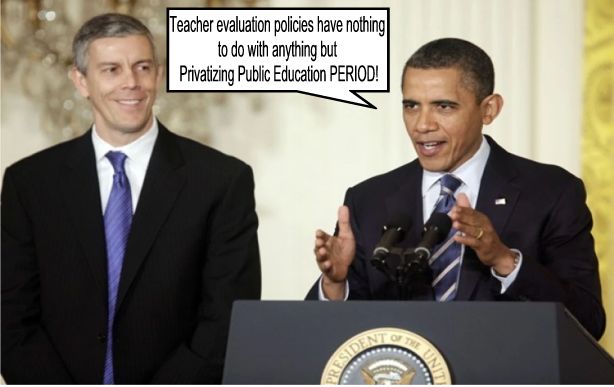I asked if Obama, Duncan know the impact of their teacher evaluation policies. This is their answer.
President Obama delivers remarks next to Secretary of Education in 2013. (YURI GRIPAS/REUTERS )
A focus of the Obama administration’s education reform effort has been the remaking of teacher evaluation systems to include student standardized test scores. States that wanted to receive federal funding in President Obama’s $4.3 billion Race to the Top education funding contest had to commit to linking test scores to teacher evaluation, and the same was true for those states that wanted to receive a federal waiver from the most onerous parts of No Child Left Behind. Most states wound up passing laws linking scores to evaluation, even though assessment experts — including the American Statistical Association — have warned against the “value-added measurement” method being used to make that linkage.
This linking has had some unusual consequences. Because there are standardized tests only in math and English Language Arts are tested, policymakers determined to evaluate all teachers on the scores devised ways of getting around the problem. They did this by, for example, evaluating teachers on the average scores of all students in a school, or grouping subjects together as they appear to relate to math or English Language Arts and evaluating teachers on those scores. For example, an art teacher in New Yorkis assessed by his students’ standardized math scores. The result: teachers are assessed on the test scores of students they don’t have and/or subjects they don’t teach.
Wondering whether President Obama and Education Secretary Arne Duncan knew that their policies had led to this state of affairs, I asked both the White House and the Education Department to respond to individual versions of this question:
Your Education Department has promoted policies that link teacher evaluation to student standardized test scores. Because tests are only given in math and English Language Arts, many teachers around the country are evaluated by the test scores of students they don’t have or by the test scores in subjects they don’t teach. For example, in New York City middle schools, it’s been estimated that over 60 percent of New York City teacher evaluations are out-of-subject. An art teacher would be evaluated in part on student math scores. Are you aware of this state-level consequence of federal policy and do you think it is fair to teachers?
The White House responded by saying that the Education Department would respond.
This is the response from the Education Department:
At the center of great schools is great teaching and parent involvement. Both rely on good information about student progress and growth. No child, teacher or school can be measured by one test; success is tied to factors way beyond just academic. But teachers and school leaders need to know how students are progressing. Parents have a right to know how their children are doing in school. Students should be able to show what they know. Moreover, when schools don’t assess student progress, it’s the performance of the most vulnerable students that gets swept under the rug. Communities deserve accountable schools. Part ofI asked if Obama, Duncan know the impact of their teacher evaluation policies. This is their answer. - The Washington Post:

